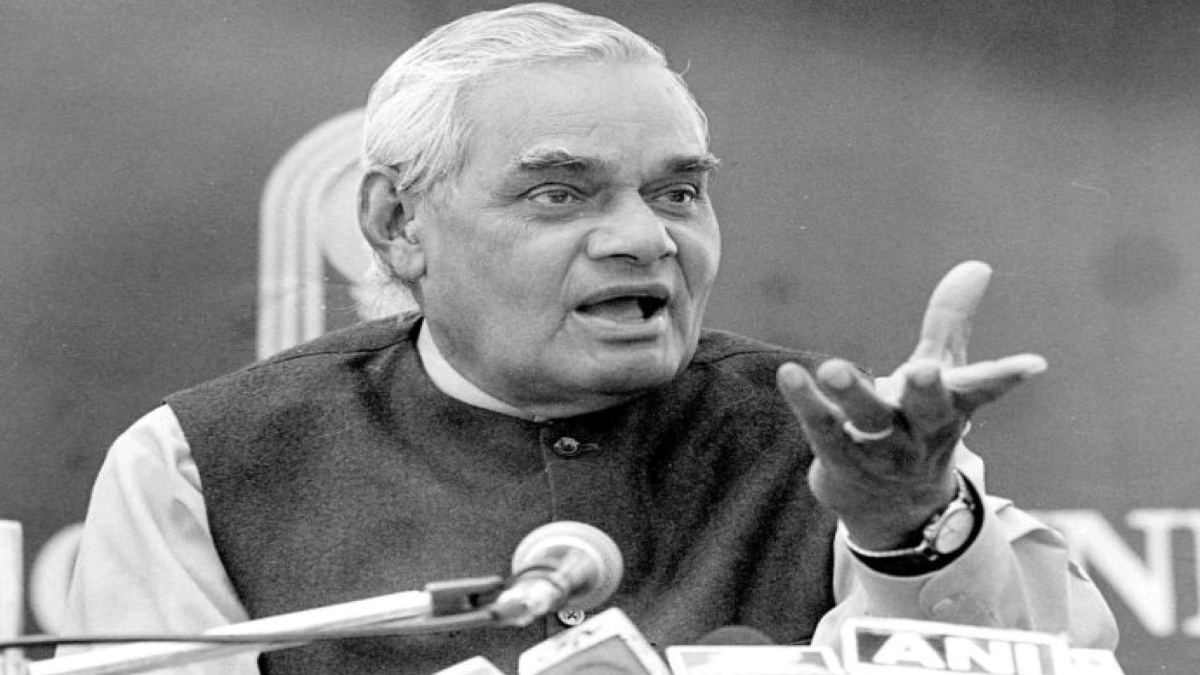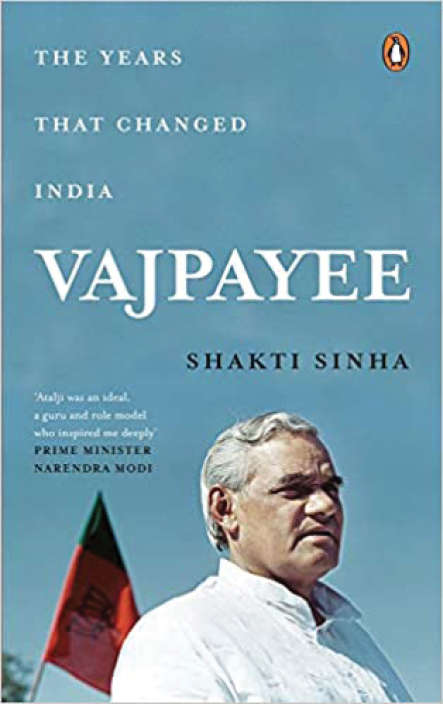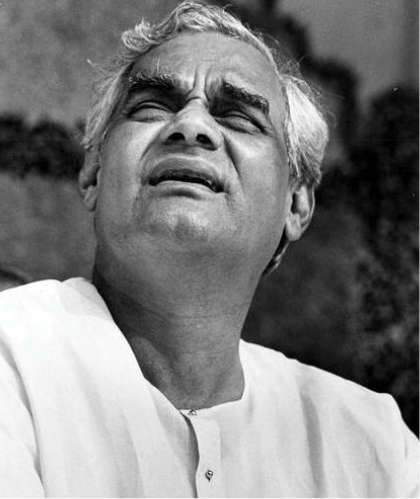


Vajpayee comes across as someone quite rooted in the Indian milieu—its culture, civilization, traditions and values. He was a liberal in the Indian sense but very different from the classical Western liberal as defined by John Locke, Jean-Jacques Rousseau and John Stuart Mill. Western secularism arose in reaction to the Church’s stranglehold over social life. This was absent in India, where secularism meant equal respect for all faiths. This difference comes out clearly from Vajpayee’s writings, speeches and actions.

His literary taste, too, was interesting. He elaborates it in great detail in a biographical note he wrote for Bindu-Bindu Vichar as well as in Decisive Days. Both of these long essays, though they cover a large span of time, were coincidentally written in the 1996-99 period. Three of his speeches in Parliament—when he moved a no-confidence motion against the Narasimha Rao government on 17 December 1992, after the demolition of the Babri Masjid; his speech on 27 May 1998, when he moved a motion of confidence in his short, ill-fated government; and his reply a day later—present a fairly clear exposition of his views of nationalism, Indian culture and traditions, and secularism and its politics.
The Ramcharitmanas of Goswami Tulsidas had a profound impact on Vajpayee, and he refers to it as his source of inspiration. According to Vajpayee, the comprehensive view of life that it presents has no parallel in the world. The Ramcharitmanas was even translated into Russian when Russia was ruled by the Communist Party. Vajpayee had an eclectic taste in his choice of literary works. However, Indian epics, folklore, patriotism and the tales of heroic figures dominated his reading list. The writers and works he has cited include Jaishankar Prasad (Kamayani), Nirala (Ram Ki Shakti Puja), Mahadevi Verma, Ageya (Shekhar: Ek Jeevani) and Jaganath Prasad ‘Milind’ (Pratap Pratigya). Vajpayee stressed that Premchand’s writing continued to be popular because it was rooted in a realism whose relevance resonated with contemporary readers.
He approved of Jainendra Kumar, who, he said, captured the reader’s imagination even as his works created controversies. Vajpayee was particularly drawn to Vrindavanlal Verma and made references to a number of his stories, like ‘Jhansi Ki Rani’, ‘Mrignayni’, ‘Virata Ki Padmini’, ‘Gad Kundar’, ‘Kachnar’, etc. The historical settings of Verma’s writings and the regional context of Braj drew Vajpayee to him. Surprising for a poet, Vajpayee felt that while poetry captures the angst of an individual, fiction has the potential to capture both the individual and society.
Vajpayee argued that literature and politics need not be two separate compartments and felt that if politicians got interested in literature, it would improve their sensitivities; a poet as a dictator would not shed innocent lives! Authoritarian rulers were cruel because their sensibilities were not developed. Vajpayee was upset that communists had misused the arts to promote their ideologies and hoped that the literary arts would be allowed to flourish without such political interference.
Vajpayee often mentioned in his writings and speeches in Parliament that he should have remained a writer. He wistfully speculated giving up politics and going to a quiet place where thinking and writing was possible, but then realized that this could not happen. In that sense, his life in politics was a dilemma which, as he wrote, he sorted out by expressing his individuality/ personality through the medium of his speeches. The writer in him spoke through his speeches, but it was not as if the politician in him was silent. He explained that the politician presented his thoughts to the writer, and the writer reconsidered them and, after study and contemplation, expressed them. The politician had gained a lot from the writer. The writer did not let the politician cross the boundaries of dignity (maryada). It is because of this vigilance that the writer was balanced in his choice of words. The politician’s speech was bound by the writer’s discipline.
Again, for a full-time politician whose career spanned more than five decades, he came across as someone quite critical of politics and political life. He wrote that politics destroyed mental peace, affection (mamta) and compassion (karuna). Political life created an unusual hollowness in the practitioners as they lived from moment to moment and assumed that their momentary glory was permanent. In politics, idealism had been replaced by opportunism, and differences between ‘left’ and ‘right’ had become personal rather than ideological. He was extremely critical of the politics of dynastic succession, which had become all-consuming. Vajpayee lamented that politics had become all about struggle for power, and that this was more so within parties than among opponents. As a loyal party person, he said that he felt happy that these evils were comparatively less in the party that he belonged to, and quoted K.B. Hedgewar, the founder of RSS, who had warned RSS members against seeking self-publicity.
Though Vajpayee did not always agree with his party, he never made his differences public, and once a decision was taken, he went along with it. Reacting to the statement that he was the ‘right man in the wrong party’, Vajpayee always explained that the fruit was a product of, and drew its qualities from, the tree. Similarly, he always rose to the defence of the RSS when it was attacked. During the 1996 confidence vote, when a lot of negative things were said about the RSS, Vajpayee strongly refuted them, saying: “I regret that during the discussion, the names of such organizations were mentioned here which are independent and are engaged in the task of nation- and character-building I am referring to the RSS. One can have differences with the ideology of the RSS but the allegations levelled against the RSS are not warranted. Even the members of Congress and other parties respect and admire the constructive work being done by the RSS and also lend their cooperation for the same. If they go and work among the poor and work for the spread of education in tribal areas, they should be felicitated for their endeavour.”
Vajpayee’s world view seems to have been profoundly affected by the communal poison that Jinnah and the Muslim League injected into Indian society on the eve of Independence, the resultant tensions and riots, and the Partition. Even in Lahore in February 1999, he publicly spoke against the division of India but added that the reality of Pakistan had to be accepted. During the 1946–47 period, Vajpayee was a student at DAV College in Kanpur, coincidentally along with his father. The city was a stronghold of the Muslim League. The times were traumatic, and as Vajpayee wrote, the more the Muslim League opposed Independence, the angrier people got with them. The result was communal polarization, tensions and riots. He described a function held in his college to discuss the Noakhali riots, when a call was made for volunteers to go to Noakhali to protect the Hindus. Though the call drew lots of support, Vajpayee opposed it at the risk of offending the majority, saying that youth would be needed in Kanpur itself to protect people against riots instigated by pro-Pakistan elements. He then gave a specific example of how many, including him, went near a Muslim-dominated area one night and patrolled the area; after that, he said, there was no more violence in that locality.
For Vajpayee, Independence Day, on 15 August 1947, came drenched in blood—a freedom on whose altar the unity of India had been sacrificed. There was both happiness and depression— happiness at the end of 1000 years of dependence; depression at the partition of the motherland. Vajpayee wrote a dark poem to commemorate Independence Day, titled ‘Swatantrata Divas Ki Pukar’ (The Call of Independence Day). He wrote that Independence was incomplete, that dreams are yet to become reality, and the oath taken on the Ravi was still to be achieved.
HOW VAJPAYEE REMAINED ‘ATAL’ IN THE FACE OF DEATH

Vajpayee’s assessment was that the rising popularity of the RSS, because of the attractiveness of its ideology, irritated the Congress. Gandhi’s assassination created an opportunity for the RSS to be banned. The RSS realized that there was no one to speak for it politically. It therefore teamed up with Dr Syama Prasad Mukherjee, who had broken off from the Hindu Mahasabha due to differences with V.D. Savarkar. Dr Mukherjee had been a minister in Nehru’s first government but later quit because of what he felt was India’s failure to protect the minorities in Pakistan, and especially with the Nehru–Liaquat pact. Dr Mukherjee’s wisdom and legislative skills were well known, and it was in their coming together that the Bharatiya Jana Sangh was established in 1951. The Jana Sangh contested the first Lok Sabha elections in 1952, won four seats and was recognized as a political party with the deepak (lamp) as its symbol. In April 1998, while inaugurating the Konkan Railway in Ratnagiri, Vajpayee would recall that the Jana Sangh had won the Ratnagiri seat in 1952.Vajpayee wrote that he was not afraid of death, and he demonstrated this in real life at least twice. On 22 January 1993, the Lucknow–Delhi Indian Airlines flight, IC 810, was hijacked, with Vajpayee on board. Vajpayee negotiated with the hijacker and got him to surrender. Later, it was established that the hijacker’s threat to blow up the plane was hollow, since he did not have any explosives on him, but this fact was not known when Vajpayee was singly persuading the hijacker to surrender. There was real fear, but that did not deter Vajpayee. On another occasion, he was quite calm, even joked about a state funeral, when the small plane he was on, flying to Dharamshala, lost its navigational aid and got enveloped in fog. The plane somehow reached Kullu, over the Dhauladhar range. It was a providential escape, but at no stage was Vajpayee frightened, while his fellow passenger, Balbir Punj, was in a panic.